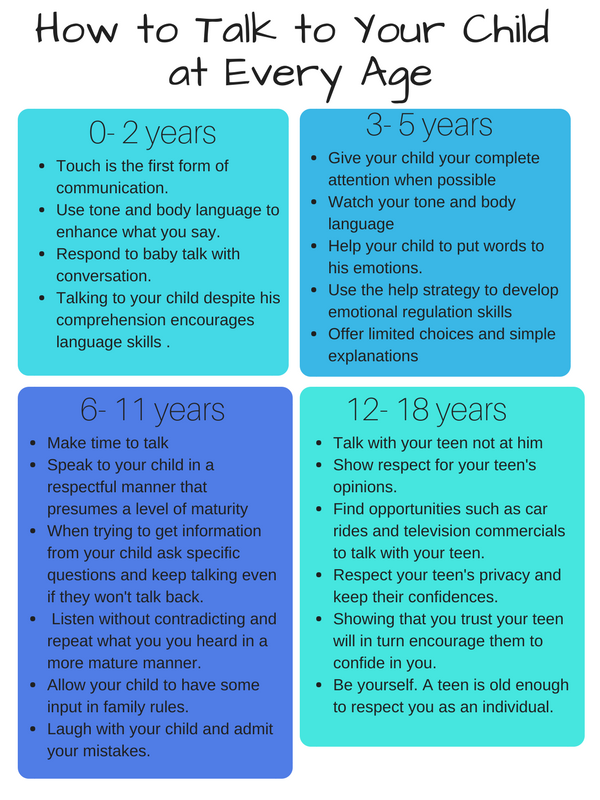From the time they are born a child’s safety is at the forefront of every parent’s mind. Then, almost overnight our little gems take their first steps and head into the world without a thought as to what kind of dangers may await.
With each new independence comes a host of new risks. It’s one thing to buy a bike helmet and show them how to look before crossing the street, but it’s another to know when is the right time to talk safety when the issues are complicated, dark, or embarrassing. How young is too young to talk about what to do if you come across a gun? Or if someone’s touch makes you uncomfortable?
In a Federal Trade Commission article on how to talk to your kids, the writer recommends this method for creating open communication with your kids.
– Talk early and often.
– Create an honest, open environment.
– Communicate your values.
– Be patient.
It’s never too early to start talking to your kids about tough topics. Children rely on their parents for information. You have the opportunity to talk to your child about these things first; before anyone else can make an impression. Use everyday opportunities as openings to bring up these topics. A TV show, song or even something you see on the street can be just the chance you need to start a conversation about your family’s beliefs and expectations. The key here is to adjust what you say and the information you give to suit your child’s age and developmental stage. [pinterest count=”horizontal”]

Tough Safety Topics
Guns
Whatever your stance on firearms, whether there are guns in your home or not, you need to be talking to your kids about them. Many loving families choose to keep firearms in their homes and take every possible precaution, but not everyone is so careful. Each year, 140 minors are accidentally killed and more than 3,000 are injured by firearms. According to a Parents magazine’s article, Guns Within Reach there are nearly 1.7 million children under age 18 in the U.S. who live with a loaded and unsecured gun in the house.
Experts recommend talking regularly about guns by the age of three, your family’s values around them, and what to do if they find one. The Parents Magazine article recommends that you ask your kids which of their friends have guns in their homes. And, no matter how awkward it may be, a question about how firearms are secured should be part of your basic inquiry when setting up a play date.
Other Gun Safety Resources
- Time Magazine: How to Talk to Your Kids About Gun Safety
- PBS: Boys and Guns
- NRA: Talking to Your Child About Gun Safety
Sex
When your children are young, sex feels like a ship far in the distance. Something we’ll deal with when it gets closer. However, according to an article in Today’s Parent, An Age by Age Guide to talking to Kids About Sex, the reality is that our children are born sexual beings. In the article Meg Hickling, a sexual health educator in Vancouver and author of The New Speaking of Sex: What Your Children Need to Know and When They Need to Know says that before age two parents should be teaching children the correct name for their body parts and what kind of behavior is okay only in private.
Talking now prepares you for answering a preschooler’s curious questions, teaching the basics of puberty to your elementary schooler or even talking birth control with your teen. I think that parents agree they want their kids to talk to them. They want them to get the right information from a reliable source. A healthy attitude about sex and sexuality is yet another thing parents are laying a foundation for at a young age.
Other Sex Safety Resources
- NYTimes: Talking to Kids About Sex
- Familyeducation.com: An Age-by-Age Guide to Teaching Kids About the Birds and the Bees
- Planned Parenthood: Talking to Kids About Sex and Sexuality
Strangers
Talking to your kids about strangers begins with basic body safety according to the Babycenter.com article, How to Talk to Your Child About Interacting with Strangers. The article says that while preschoolers may have trouble understanding who is safe and who isn’t, they aren’t too young to learn basic body safety. Very young children should be taught the correct word for their genitals and about safe touch and bad touch. It’s also really important for very young children to begin to learn about consent. This means not forcing your child to kiss or hug someone they don’t want to and teaching them from a young age to trust their instincts about people. Older children can understand how strangers could be mean or nice.
In her post, Tricky People are the New Strangers, Sarah Kate Levy of Checklist Mommy suggests teaching your kids to beware of “tricky people”. This makes sense. Kids don’t know if a stranger is good or bad, but they can understand that anyone who asks them to keep a secret or do something without their parent’s permission is BAD. Another great tip is to teach your children that if they ever get separated from you to look for another mommy with children.
Other Stranger Safety Resources
- National Crime Prevention Council: What to Teach Kids About Strangers
- Babble.com: How to Teach Stranger Danger
- Scholastic.com: Talking About Stranger Safety
Drugs
I don’t know about you, but my 3-year-old can’t distinguish between Flinstone vitamins and candy. We’ve talked repeatedly about why she can’t just eat the bottle and how medicine is not candy. Without knowing it, I’ve laid the foundation for her understanding of drugs. Preschoolers are old enough to know that there are good medicines and bad ones. An article on the website Kids Health advises that you take advantage of these teachable moments with young children. Then, as your children grow older you can start asking them what they think about drugs. By asking a question in an open-ended and non-judgemental way, you are likely to get an honest answer. Be sure to really listen to your child and show him or her that you care about their concerns or questions.
Phoenix House, a national substance abuse program writes on its prevention page that drug use prevention starts with the family. They say that children who resist early drug experimentation are those that are more adept at problem-solving and self-help. All skills that parents teach in the preschool years. What more, they advise that we all consider the behaviors we model around the use of tobacco, alcohol and other drugs.
Other Drug Safety Resources
- Parents.com: Talking to Your Child About Drugs
- DrugAbuse.gov: Communicating the Risks of Marijuana Abuse
- Baby Center: How to Talk to Your Child About Drugs










